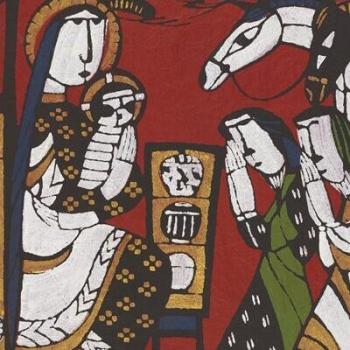Let me put what I am about to say in context. I love Christmas, and I am hopelessly sentimental about it. One of my fondest childhood memories is the big unveiling of the Christmas tree that my parents staged every Christmas morning when I was a child.
And I still enjoy it all: I enjoy shopping for Christmas gifts. We have three trees (two of them are small): what we call, a toy tree, the book tree (big surprise there), and the main tree. Once any of them are up, I turn the lights on every morning. Mother Natalie and I will spend the day working at our own pace on a Christmas meal that will be way too elaborate for two people. And, as of this week, I think that we have hit on another tradition: The Vince Gill-Amy Grant Christmas Concert at the Ryman Auditorium.
So, now you know that I am not unsympathetic to the many things that we will all spend our day doing. That said, the only good reason for celebrating Christmas is far from sentimental. As Philip Yancey puts it, Christmas is “an invasion, the decisive advance in the great struggle for the cosmos.” And these pointed words from the Gospel of John define what that invasion is all about: “…he gave power to become children of God, who were born, not of blood or of the will of the flesh or of the will of man, but of God.”
Let me take a bit of time this morning to explain what that means, and – forgive me – this will be necessarily sweeping and pointed. But John is pointed, too.
First, by way of background: For all the historical changes down through the millennia – and all the cultural variations that have been tried – there have never been more than two ways to navigate life successfully. The accident of birth and the exercise of effort or power. That has always been the case historically, and it’s still the case today.
By accident of birth, I simply mean the random accident of being born in the right place at the right time. We think of being born into the right class or the right caste as something that determined human fortunes in the past, or – if it still happens – it happens in other parts of the world – countries with kings, queens, and royalty or India, where the caste system still shapes the fortunes of millions.
But, if you live in Washington, DC for any length of time (as I did), you know that still happens in this country, too. We call them connections. If you’ve lived in Chicago, as we did, you know they are called “knowing a guy”.
In the South, it can be rather more elaborate: The most vivid reminder I had of it was in Mobile, Alabama. I had been asked by the Dean to lead a day long conversation about challenge of loss and grief. At lunch I found myself at a table with grand-dames of the parish and the Dean, who asked the grand-dame of them all about a woman they both knew who had moved to Mobile from Atlanta. Her response to the Dean was, “Johnny, dear, you don’t want to know that woman. I have tried to introduce her to polite, Mobile society, with no luck at all. She asked me the other day, “Where does one buy fine linens in Mobile?” I told her, “One does not buy fine linens in Mobile, one inherits them.”
Lest you imagine this is only southern practice, I should also note that an old friend of mine who served a church on the Philadelphia Mainline was asked, “Now, dear, tell me again, who was your mother?”
Historically, the other path to adult life has been the exercise of effort or power of one kind or another. There are many different kinds of power, to be sure. Power can be consolidated with wealth and influence. It can be acquired through persuasion and manipulation, or it can be achieved by unstinting effort. Whether it is the power of brains, brawn, or influence, effort often amounts to the same thing: You are only as good, well-off, or safe as your last effort.
Some of the great tyrants of the past have been truly unremarkable people without much in the way of advantages by way of class or connections, who consolidated power of various kinds. Adolf Hitler is an example from the last century. Vladimir Putin is an example whose exercise of power has stretched across the last and the current century. But, of course, the attempt to save ourselves through our own effort is far more widespread. Anyone who has struggled with perfectionism, fear, or abandonment is aware of just deeply the temptation to save ourselves can run through the human psyche.
Whether we rely on birthright or effort, the difficulty, of course, is that no matter how we try to navigate life and no matter what we choose as a life’s goal, misfortune, illness, and death will inevitably frustrate our plans. If not now, tomorrow. There is no such thing as a hearse with a luggage rack. And even noble goals, such leaving a legacy of love, are eventually swept away by misfortune, illness, death or just the passage of time.
Or, so it seems. But, as John notes, in Christ God changes both the aim and the means by which live our lives. And it is that great truth that we celebrate at Christmas.
Christ puts an end to navigating life by inheritance and effort, class, and strength. In the Kingdom of God, none of these things distinguishes us from one another. They are realities, of course. Christianity has always been realistic. But those things do not determine our worth before God. And our worth before God is the only reality that transcends time.
Laying aside those burdens is a radical act of liberation. No one who has ever paid close attention to the demands of life imagines that we can save ourselves even if, in a moment of health or wealth, we might convince ourselves for a moment or two. The testimony of our own lives and that of those around us, is that no one possesses advantages of birthright or strength that can fully master life’s challenges. Death comes to the strong and the weak, those born to thrones and those who live on the streets. And the witness of the Gospel is that the power of death, while present everywhere in this world, will not prevail in the world to come.
But the message of Christmas also speaks to life’s goal and purpose. John does not just declare that in the coming of Christ God’s power has come to our defense. He declares that – in Christ – we have been made the children of God. That goal may seem innocent and innocuous, but it is not.
It is the liberation of our lives from goals that are too small and too fragile. Lives shaped and by paying bills, buying and selling, benchmarks and evaluations, degrees and achievements. We know those goals are too small. The only thing that keeps us from acknowledging it is ignorance or denial. That is why therapists make a living out of helping us to understand that a mid-life crisis is often rooted in the question, “Is that all there is?”
The message of Christmas, however, is that as the children of God we are on a spiritual journey into God in Christ. A journey of growing acquaintance with God, with God’s will for our lives, a journey into deeper wisdom, and greater love. And no one is excluded from that journey. There is no Jew or Gentile, no male or female, no difference between the high born and those who live on the edge of society, no difference between the whole and the handicapped, the young and the old, those who are in full possession of their mental faculties and those whose minds are fading. The journey that we celebrate this day is God’s work, not ours. And because both the goal and means belong to God, they are beyond the corrosive power of death in all its forms.
This day, may you rest in that promise. May you share that good news with others. And together may we live with freedom and courage alongside the one who invades our lives to save us.
Here’s wishing you a very merry, unsentimental Christmas.
Amen.
Photo by Sixteen Miles Out on Unsplash













